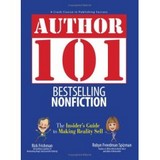Make Your Book Stand Out
 Over the last few days, I've read the latest addition to the Author 101 brand from Rick Frishman and Robyn Freedman Spizman called Author 101: Bestselling Nonfiction. I've written about each of the books in this series and while I understand the branding thoughts that went into the packaging for these books. They appear very similar. Each Author 101 book tackles a different part of the publishing process. The black cover is on agents while the yellow cover is about book proposals and the green one is about book publicity. The newest title looks at the topic of the nonfiction book and is subtitled, "The Insider’s Guide to Making Reality Sell."
Over the last few days, I've read the latest addition to the Author 101 brand from Rick Frishman and Robyn Freedman Spizman called Author 101: Bestselling Nonfiction. I've written about each of the books in this series and while I understand the branding thoughts that went into the packaging for these books. They appear very similar. Each Author 101 book tackles a different part of the publishing process. The black cover is on agents while the yellow cover is about book proposals and the green one is about book publicity. The newest title looks at the topic of the nonfiction book and is subtitled, "The Insider’s Guide to Making Reality Sell."
I've written a great deal about the importance of a book proposal. This book moves beyond the proposal (and includes a small amount of information about it) to the full-length process of creating a nonfiction book with chapters such as Getting Started, The Big Idea, Does a Market Exist?, Planning and Outlining, Research, Getting Organized, Writing, Making It Special, Collaboration: How It Works, Collaboration: The Legal Implications, Tips: the Top Twenty, Mistakes: The Top Twenty and Summing Up. I found each chapter contained valued insight from not only these authors but a number of best-selling authors who they quote throughout the book.
I loved the opening of the Making It Special chapter and here’s a bit of it for a sample of this book, "According to estimates 195,000 books were published in 2004, so the market for books is densely crowded. To interest publishers and readers, your book has to be distinctive and special, otherwise it will probably never be read. To make your book special, use every weapon in your arsenal; pull out all the stops. After you've clearly and intelligently written about all your essential points, impress agents and publishers with the full extent of your creativity and talent. Show them that you not only write brilliantly, but that you also have great, innovative ideas and that you will work tirelessly to make your book a gigantic success. Read extensively. Go to libraries and bookstores and note the qualities in books that you like and try to incorporate them into yours. Since books are not your business, study them from a new perspective. Examine book covers, titles, subtitles, designs, approaches, and writing styles to find the elements you like and that could work well for your book. Although most publishers insist on the right to decide on book covers, titles, and designs, give them your ideas. If you’re talented in any of those areas, offer your ideas and recommendations. Some may consider your suggestions and may even adopt those that could help your book."
I hope you can see the wisdom of years of publishing experience which is loaded into this brief quotation. The key will be where the rubber meets the road. How will you apply this information to your writing? Will you get this book (or another book) and continue growing as a writer? If you get the book, make sure you read it. You'd be surprised how many people purchase the book then never open it or read the information inside it. Maybe you are looking at various writers conferences and planning to attend one of them. What are you doing to prepare for your conference? I guarantee you will get more out of it if you put in some preparation time.
What are you doing to expand your own publishing experience? While your primary goal may be to get a book published, understand literary agents and editors are looking for experienced authors. You can gain (and prove) your experience with print publishing credits. Notice I said printed magazines and not online. It's because the publishing process is much more rigorous for print publications than something you've written online. What are you doing to make your book idea stand out? It will take work and creativity. I'm up for the task. What about you?





















0 Comment:
Post a Comment
That's the writing life...
Back to the home page...